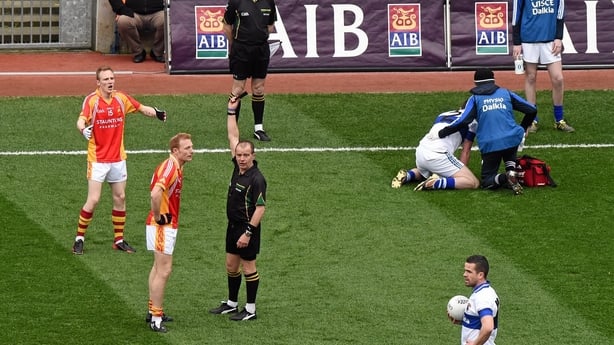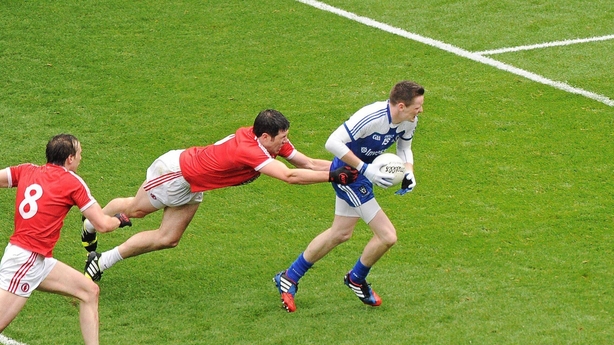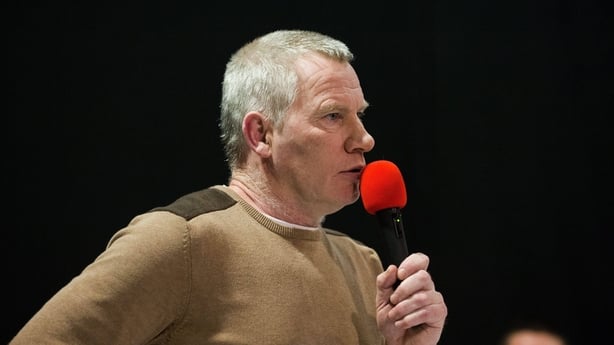Happy birthday to football's black card, 10 years old today but unlikely to get too many presents in the post.
Maybe some have probably trickled through in recent years as the criticism has softened, although the poor lad has had to wait 10 minutes to open them.
The sin-bin inspiring card, handed out for 'cynical behaviour infractions’, as per the GAA’s official guide, has been the subject of debate, discussion and, let’s be honest, a whole lot of derision ever since congress gave it the green light in Derry in March 2013.
Perhaps fittingly, the first black card went to the Oakleaf County, Declan Mullan the answer to that particular quiz question. He was sanctioned by referee Brendan Rice in an O’Fiaich Cup clash with Louth, the game played under the new rule even if it was taking place nearly a month before the new punishment officially began operating.
There are Derry threads weaved throughout the implication of the black card, but not all as binding as one might think.
What of its inception?
Well, for plenty their memory bank would take them back to the 2013 All-Ireland quarter-final and Oakleaf pundit Joe Brolly, incandescent with anger, going on a solo run on The Sunday Game, entering the phrase "you can forget about Seán Cavanagh as a man" into the GAA lexicon alongside other greats such as "you can’t win a derby with a donkey", "people of Galway, we love you" and "will you put the f**king ball in".
Brolly was reacting to Cavanagh’s pulldown of Conor McManus – or Ciaran as he was commonly referred to in some media reports at the time - as he raced through for a possible, almost certain, goal that would have put Malachy O’Rourke’s side a point up with just over 20 minutes to play.
[Side-note: Despite McManus making his debut in 2007, the Clontibret ace had yet to score a championship goal by that stage, with his first coming the following year against Armagh.]

A poll run by the42.ie afterwards asked whether Cavanagh made the right decision. Some 1841 people said no, 871 souls - presumably with Omagh IP addresses - said yes and then 1010 sat on the 'don't know' fence.
The incident mattered little in the grand scheme of things. That Croke Park game took place in August 2013, well after the horse had bolted at congress the previous March.
Initially, a black card meant that your game was over with a substitute instead taking your place before a 2019 special congress changed it to the 10-minute sin bin rule that is currently in operation. Hurling also introduced a black card in 2021, but like the six-second goalkeeper rule in soccer, everyone just decided it was best ignored.
There have been some notable black cards during its decade of existence, Mullan amongst them.
Richie Feeney’s bodycheck five minutes into the 2014 All-Ireland club final also sticks out, the Castlebar player taking to X, known as Twitter back then, to apologise publicly after the Mayo side’s loss to St Vincent’s.
Then there was the 2016 All-Ireland final replay between Dublin and Mayo where Jonny Cooper and Lee Keegan were black carded. "In a very real and terrible way, the black card dominated the All-Ireland football final," Jim McGuinness wrote in his Irish Times column afterwards.
The GAA have ridden the storm, and undoubtedly the sin bin option has been a smart move even if some sides can be cute about running down the clock. Teams are punished numerically and a player's day is not necessarily over for what could be a clumsy tackle or, in some cases, a wrong interpretation by a match official. Feeney's All-Ireland club black card incident happened with 4:04 on the clock; with today's rules he would have been back on for the second quarter.
The association released data to justify the new sanction after the first inter-county championship that featured the black card rule in 2014. Cards – all three colours – fell from an average of 7.35 in 2013 to 4.32 the following season. Scores rose by nearly 10% and goals moved up from 1.98 per game to 2.34.
They were trying to sell it, although buyers were scarce in those early formative years.

Back to Derry then and one of its most famous sons, Tony Scullion - a man who had, and has, the utmost faith in the black card.
The four-time All-Star sat on the Football Review Committee, chaired by the late Eugene McGee, that recommended that the black card, well a revamped yellow card actually, be brought into rule.
They analysed 61 games in all – played from 2001 to 2011 - to seek trends and surveyed over 3,000 people with "cynical and tactical fouling" the biggest dislike amongst participants.
Measures to tackle those issues were originally set to see the yellow card be altered to result in a sin bin before modifications from the GAA’s rules advisory committee saw the original black card go to congress.
With a number of counties, hurling strongholds like Tipperary, Cork and Limerick in particular, coming out against, the vote was set to be close, but it earned 70.82% in favour having required a two-thirds majority to pass.
Speaking a decade on from its exposure to the GAA world, the Ballinascreen man, who represented his county in both football and hurling, believes it has been a "brilliant" addition to the rule book.
"When it was implemented there were a lot of people who had different thoughts on it than I had back then, that I still have," Scullion told RTÉ Sport.
"It’s not because I was involved in introducing it, but I think it’s been brilliant and it has helped our game, absolutely, full stop.
"Maybe at the start, and still now, referees can interpret incidents differently from one to the other, but when you look at the rules at the black card, the key word is ‘deliberate.’"

The proof is in the pudding for Scullion, a man who consumes GAA content at a rate of knots. He doesn’t see many deliberate trips anymore or calculated pulldowns. Most importantly, he rarely spots a body check that leaves an opponent lying in a heap on the ground.
"It was coming into our game at the time and it was a really, really dangerous tackle.
"That body collide, the third man tackle, that’s been taken nearly completely out of the game now.
"That’s good because not alone is it a deliberate ploy to stop a player moving for the return, but it’s a very dangerous tackle. If you’re hit down the middle, if someone turns into you with their shoulder right down the middle of your chest, it’s very tough on the player receiving it.
"That body collide, the third man tackle, that's been taken nearly completely out of the game now."
"The drag down, tripping, I think teams and coaches took that on board.
"If I was truthful, some teams are working the sin bin, using up the 10 minutes unfairly feigning injury; that’s nothing to do with the rule, but it happens.
"But I firmly believe it has helped our game. I felt that it would be accepted after it had time to bed in."
That time is 10 years now and the black card has become a familiar part of Gaelic football, less so hurling. The controversy has died down in that time, it’s here to stay.

